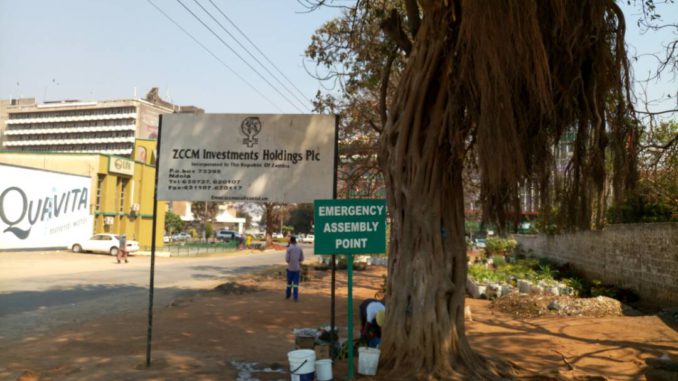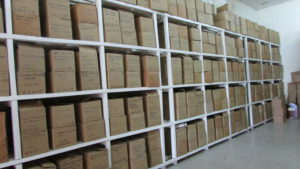
Miyanda Simabwachi is a PhD Candidate at the International Studies Group, University of the Free State, South Africa. Her research deals with the politics of and public access to archival documentation in Zambia.
I am currently engaged in a research project that seeks to investigate the historical processes and factors behind the formation of archives in Zambia. To this end, I visited the Zambia Consolidated Coppermine (ZCCM) archive situated in Ndola, the provincial town of the Copperbelt. The archive was originally established in 1962 for the custody of records generated by the Roan Selection Trust, one of the earliest mining companies in the colonial Copperbelt. Its holdings now include archival documents from other subsequent mining companies, such as Roan Consolidated Mines, Nchanga Consolidated Coppermines, ZCCM and ZCCM-Investment Holdings (PLC). Archival documents generated by these mining companies date from the 1920s to 2000, when the ZCCM was completely privatised. The mining companies that were formed after the privatisation of ZCCM have their own arrangements for the preservation of records. However, records from the corporate structure of the privatised ZCCM Investment Holdings, which is in charge of the operation of the private mining companies, are still deposited with the institution.
 The ZCCM archive is not only a place for scholars interested in mining history, but also for cultural and social historians. It is also used by former employees and their family members who flock to the archives for personal information relating to claim benefits and patents. The ZCCM archive consists of documents such as the directors’ minutes, attendance books, and registers which record the directors’ holdings, interests, as well as all major decisions of the various companies since their foundation. There are also records on trade unionism from the mid-1930s and an assortment of annual and monthly financial reports from the late 1920s. Personnel and welfare records from the early 1920s include reports by compound managers on hospitals, beerhalls, recruitment, indigenous labour, housing, films, food rations, tribal representative meetings and many technical and operational records. In its custody are also records pertaining to production methods, costs, taxation, profits, surface rights and mining. Other collections deal with medical services, industrial relations and trade unions, housing, townships, security, power supply, secondary industries, pollution, sport and many more. All the records in the ZCCM archive are readily accessible to researchers, as the institution practices an open access policy.
The ZCCM archive is not only a place for scholars interested in mining history, but also for cultural and social historians. It is also used by former employees and their family members who flock to the archives for personal information relating to claim benefits and patents. The ZCCM archive consists of documents such as the directors’ minutes, attendance books, and registers which record the directors’ holdings, interests, as well as all major decisions of the various companies since their foundation. There are also records on trade unionism from the mid-1930s and an assortment of annual and monthly financial reports from the late 1920s. Personnel and welfare records from the early 1920s include reports by compound managers on hospitals, beerhalls, recruitment, indigenous labour, housing, films, food rations, tribal representative meetings and many technical and operational records. In its custody are also records pertaining to production methods, costs, taxation, profits, surface rights and mining. Other collections deal with medical services, industrial relations and trade unions, housing, townships, security, power supply, secondary industries, pollution, sport and many more. All the records in the ZCCM archive are readily accessible to researchers, as the institution practices an open access policy.
Requests to access the archives came from academic historians, geologists, government officials and former employees of the mining companies, to name but a few. This reflects the extent to which the ZCCM archival documents have served a varied range of research needs, not only of academics, but also of the wider society. Yet they are rarely the object of historical analysis. Archives are themselves historical objects of study, with multifaceted forces behind their formation. These records have largely contributed to the writing of cultural, social, economic and political histories of Zambia and beyond. Broadly speaking, much of the disciplinary practice of history tends to focus on the limitations, possibilities and nature of archives as sources of historical investigation. Locally, the main emphasis of both colonial and post-colonial accounts is the crucial role of archives in the reconstruction of Zambian history and their envisaged contribution to the resolution of contemporary problems of a historical nature.
The broader aim of my research project is concerned with investigating a key aspect of historical knowledge production, both in a colonial and post-colonial context, through a history of the Zambian archives. It is concerned with examining the formation of colonial and post-colonial archives in Zambia, in particular their provenance, the historical processes involved and the role of political and economic forces in shaping them. Archival documents in the custody of the ZCCM, in particular, have a history worthy of investigation, especially given the complex historical processes and the political and economic forces that shaped them. Apart from being generated from Zambia’s economic mainstay mining activities, they have also been subject to the impact of political and social transformations at various levels – within the mining industry of the Copperbelt region, as well as nationally and internationally.
In this regard, during the Federation of Rhodesia and Nyasaland between 1953 and 1963, the head offices of the mining companies operating in colonial Zambia were transferred to Southern Rhodesia (Zimbabwe) as part of the Federal arrangement. Technical offices of companies such as the Anglo-American Mining Company were based in South Africa, and its marketing offices in the United Kingdom. Thus, some of the records pertaining to mining in the colonial Copperbelt were generated in the diaspora, and only a selected few were repatriated to Zambia in the late 1970s. The nationalisation of the mining sector in the 1970s had a significant impact on the management of archival documents. All documents generated by the mining companies were placed under a joint archival management. The subsequent privatisation of the mining companies in the early 1990s exposed the archives to theft. Redundancy and reduced economic status among the Copperbelt population, as well as the effects of privatisation, positioned the archives as merchandise for sale for the sake of survival.
There are comparative parallels between the mining archives and the state controlled National Archives of Zambia, as well as the political archive of the United National Independence Party (UNIP). Between 1946 and 1963, documents from Zambia’s public archives pertaining to the colonial period were also preserved in Southern Rhodesia (Zimbabwe) in a joined archival institution called the Central African Archives, and later the National Archives of Rhodesia and Nyasaland. These archival records were only repatriated to Zambia after its independence in 1964. In 1991 Zambia transited from a one party state to a multi-party democracy, and archival legislation was amended, with implications for the holdings of the National Archives. All archives pertaining to political parties in Zambia, which were in the custody of the political archives of the United National Independence Party, had to be deposited with the national repository.
Zambians have been excluded from accessing certain aspects of their history because key documents of Zambian national history are kept elsewhere (Zimbabwe and Britain). This is a reminder of the unequal power relations under colonial rule and this colonial legacy still pertains knowledge production in Zambian history today. The burden of distance presents a serious impediment for potential Zambian users of documents in the diaspora.
By drawing comparisons from the transformation and the development of processes whereby archives in the custody of the privately owned ZCCM and the state controlled National Archives were generated, as well as the political-economic environment of the colonial and post-colonial periods; I hope to understand the politics and contestations at play in the archives’ construction, their trajectory, and the transformation of power relations over time.
